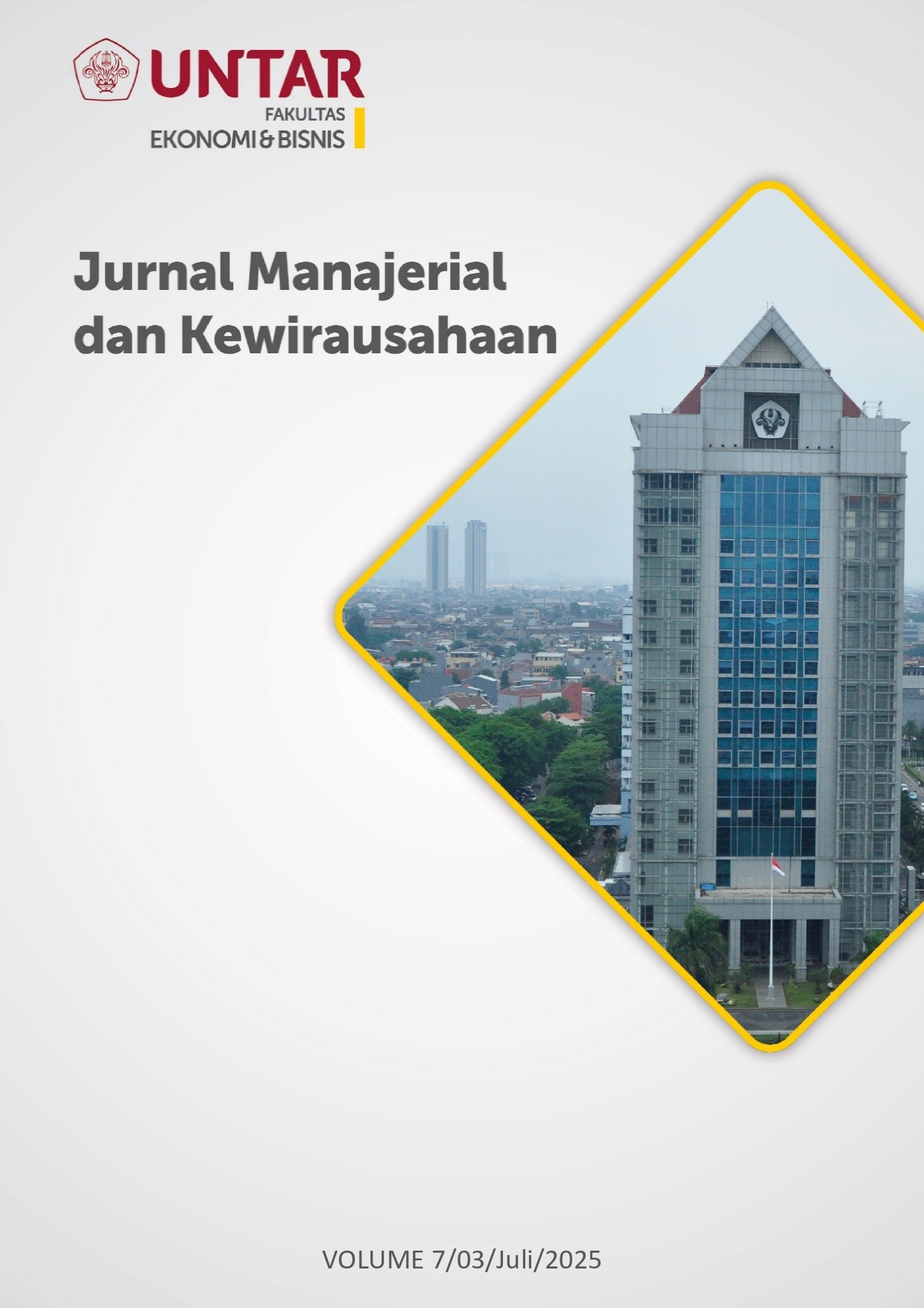Pengetahuan Kewirausahaan dan Efikasi Diri sebagai Faktor Penentu Minat Berwirausaha pada Mahasiswa Universitas Tarumanagara
Main Article Content
Abstract
Penelitian ini bertujuan untuk menganalisis pengaruh pengetahuan kewirausahaan, efikasi diri, dan locus of control terhadap minat berwirausaha mahasiswa Universitas Tarumanagara. Kewirausahaan berperan penting dalam meningkatkan perekonomian melalui penciptaan lapangan kerja dan pemerataan pendapatan. Penelitian menggunakan pendekatan kuantitatif deskriptif dengan metode korelatif, melibatkan 205 mahasiswa aktif yang dipilih melalui teknik purposive sampling. Data dikumpulkan melalui kuesioner online dan dianalisis menggunakan perangkat lunak SmartPLS 4. Hasil penelitian menunjukkan bahwa pengetahuan kewirausahaan, efikasi diri, dan locus of control berpengaruh positif dan signifikan terhadap minat berwirausaha. Temuan ini memberikan kontribusi penting bagi literatur kewirausahaan, khususnya dalam memahami faktor-faktor penentu minat berwirausaha. Penelitian ini juga menyoroti pentingnya pendidikan kewirausahaan untuk meningkatkan motivasi dan kesiapan generasi muda dalam memulai bisnis.
This study aims to analyze the influence of entrepreneurial knowledge, self-efficacy, and locus of control on entrepreneurial intentions among students at Tarumanagara University. Entrepreneurship plays a vital role in enhancing the economy by creating job opportunities and distributing income more equitably. This research adopts a descriptive quantitative approach with a correlational method, involving 205 active students selected through purposive sampling. Data were collected via online questionnaires and analyzed using SmartPLS 4 software. The results reveal that entrepreneurial knowledge, self-efficacy, and locus of control have a positive and significant impact on entrepreneurial intentions. These findings contribute to the entrepreneurship literature, particularly in understanding the determinants of entrepreneurial intentions. This study also highlights the importance of entrepreneurship education in fostering motivation and readiness among the younger generation to start businesses.
Article Details
Section

This work is licensed under a Creative Commons Attribution-NonCommercial-ShareAlike 4.0 International License.
This work is licensed under a Jurnal Muara Ilmu Ekonomi dan Bisnis Creative Commons Attribution-ShareAlike 4.0 International License.,/p>
References
Astiana, M., Malinda, M., Nurbasari, A., & Margaretha, M. (2022). Entrepreneurship education increases entrepreneurial intention among undergraduate students. European Journal of Educational Research, 11(2), 995-1008. https://doi.org/10.12973/eu-jer.11.2.995
Brahmana, S. S., Padmakusumah, R. R., & Nilasari, I. (2021). The effect of locus of control on organizational commitment. Review of International Geographical Education Online, 11(5), 8-15.
Brownell, P. (1981). Participation in budgeting, locus of control and organizational effectiveness. The Accounting Review, 56(4), 844-860.
Databoks. (2023). September 2023: Tingkat Pengangguran Indonesia Tertinggi ke-2 di ASEAN.
Databoks. (2024). Mei 2024: Jumlah Wirausaha di Indonesia Awal 2024, Mayoritas Pemula.
Hamel, C., & Wijaya, A. (2020). Pengaruh orientasi kewirausahaan dan orientasi pasar terhadap kinerja usaha UKM di Jakarta Barat. Jurnal Manajerial dan Kewirausahaan, 2(4), 863-872. https://doi.org/10.24912/jmk.v2i4.9865
Hidayat, M., & Citra, C. (2020). The Influence Of Entrepreneurial Competence, Market Orientation And Entrepreneurial Motivation On Coffee Shop Business Performance In Makassar City. Mirai Management Journal, 5(1), 244–256
Ikpesu, O. C. (2020). Fundamentals of Entrepreneurship Practice. Divinetone publications Lagos State Nigeria
Ismatulloev, A. N., & Nazarov, A. M. (2022). The level of subjective control and its influence on the activity of the person. Science and Education, 3(2), 751-754.
Karyaningsih, R. P. D. (2020). Does entrepreneurial knowledge influence vocational students’ intention? Lessons from Indonesia. Entrep. Bus. Econ. Rev. 8 (4), 138–155.
Pamungkas, A. P., (2021). Pengaruh Self Efficacy, Pendidikan Kewirausahaan dan Ekspektasi Pendapatan Terhadap Minat Berwirausaha Mahasiswa Program Studi Akuntansi Fakultas Ekonomi Universitas Negeri Yogyakarta. Jurnal Profita: Kajian Ilmu Akuntansi, 6(3).
Primandanu, & Noormalita. (2017). Analisis Faktor-Faktor yang berpengaruh pada Minat Berwirausaha Mahasiswa. Jurnal Economics, 68-78.
Shahbakhsh, M., Elhamian, N., & Pour, H. S. (2019). Empowerment Relationship in Intra Organisation Entrepreneurship. Dutch Journal of Finance and Management, 3(1), em0058.
Soelaiman, L., Keni, K., & Puspitowati, I. (2024). Empowering entrepreneurial intentions: educational support and self-efficacy in MBKM context. Jurnal Manajemen, 28(1), 23-44. https://doi.org/10.24912/jm.v28i1.1760
Susetyo, D. P., & Firmansyah, D. (2023). Literasi Ekonomi, Literasi Keuangan, Literasi Digital dan Perilaku Keuangan di Era Ekonomi Digital. Economics and Digital Business Review, 4(1), 261–279. https://doi.org/10.37531/ecotal.v4i1.331
Wang, L. Y., & Huang, J. H. (2019). Effect Of Entrepreneurial Self-Efficacy On The Entrepreneurial Intentions Of Students At A University In Hainan Province In China: Taking Social Support As A Moderator. International Journal of Learning, Teaching. and Educational Research, 18(9), 183–200. https//doi.org.10.26803/ijlter.18.9.10

